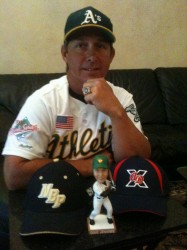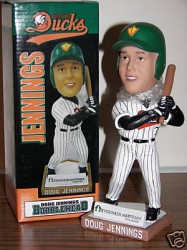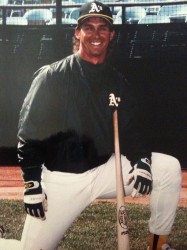Doug Jennings’ 21-Year Pro Resume A Blessing For North Broward Program

21-year Pro Doug Jennings with his most prized memorabilia
Doug Jennings is not afraid to get his hands dirty.
Scratching and clawing with hard work is how he got where he is in life, and he simply doesn’t know any other way.
The North Broward Prep assistant coach is well known on the team for his willingness to do whatever it takes to help make the Eagles’ players better at their games. He understands that each member must play to their capabilities, and that players understand their body sizes and what their roles are on the team. He reminds players not to go outside of themselves or else risk failing right out of the game.
The trust from his North Broward players did not come right away, especially as some clung to clichés they had learned over the years. They looked at Jennings like he had three heads when he suggested different approaches than those they were familiar with.
So Jennings took some swings and showed them, and suddenly his credibility turned the corner with them. The players were in awe as he displayed hitting the likes of which he professed they could also achieve. Players wanted to know if he had ever played professionally.
“Well, yeah, I did play,” Jennings replied, perhaps the biggest understatement of his life.
Doug Jennings played a 21-year professional baseball career that spanned several leagues at multiple levels of baseball, including the major leagues and also the Japanese Professional League. A 1984 second-round pick by the former California Angels, Jennings was a Rule 5 Draft Pick by the Oakland Athletics who played for the team during the “Bash Brothers” era from 1988-1991, in which Oakland won a World Series title in 1989. He was also a key contributor for the Orix Blue Wave in the Nippen Professional Leagues in Japan, teaming with Ichiro Suzuki to help end a 17-year championship drought for the Blue Wave.
Jennings spent a good majority of his MLB career in the minor leagues, also playing for the Chicago White Sox, Kansas City Royals, Baltimore Orioles, Milwaukee Brewers, Cincinnati Reds and the Chicago Cubs. He was a key member of the Reds’ 2004 Minor League Championship team and also started for minor league all-star teams. In fact, from 1988 to 1996, Jennings was a part of seven championship teams. His final championship season came in 2004 with the Long Island Ducks in the Independent Leagues, where he was a player/coach who had an MVP season while setting all-time team records for batting average and RBI. He also set an Atlantic League record with an amazing .505 on base percentage.
But the biggest indicator of his career’s success came on July 9, 2005, when the Long Island Ducks and sponsor Evergreen Mortgage presented “Doug Jennings Bobblehead Night” by giving away 2,000 bobblehead dolls specially made in Jennings likeness.
“I told my manager Buddy Harrelson that I had 20 years in the pros, but it wasn’t until I won a title with the Long Island Ducks that I finally made it onto a bobblehead,” Jennings joked.

Doug Jennings' Long Island Ducks bobblehead
This ability to stay grounded and not carry a large ego is a credit to Jenning’s character, which is perhaps his best asset.
“I learn from him, and he helps me a great deal as a coach. We feed off of each other,” North Broward coach Brian Campbell said. “He’s also a great friend, and we are lucky to have him around.”
Jennings jokes that the two get along so well because they are both “good ole Southern boys from Georgia” who don’t carry large egos that could get in the way. They bounce ideas off each other and trust one another.
“Coach Campbell is a good, methodical coach who runs a solid program,” Jennings said. “He is a blue-collar type who goes about his business and who is very much about the kids. He won coach of the year this past season, and it was weeks before any of us even knew about it.”
Campbell took over the program a few seasons ago, and North Broward Athletic Director Scott Williams approached Jennings about the possibility of bringing him in so Campbell could benefit from having someone alongside him who he could trust. This past season, the fruits of those labors really manifested as the Eagles earned their first state tournament bid.
When Jennings evaluates his players, he is imagining them at the professional level, and that is how he approaches their coaching. Based on his experience and versatility having been the MVP-guy hitting in that 3-4-5 slot to also being a utility player who doesn’t play everyday, he relates to every type of ballplayer.
“I can identify with the pro prospects on the team as well as the 12th to 15th kid who doesn’t play as much and is trying to figure out how to contribute,” Jennings explained.
His ability to “change gears” to relate to each type of player provides incredible benefits for the Eagles players.
“His experience is invaluable,” Campbell said. “He’s a worker, and he takes ownership of the program. He is a huge part of what we do here, and he does a great job for us.”
Although Jennings hopes his future path ultimately will lead him back to the major leagues as a coach, he knows the rewards he enjoys right now are in helping kids achieve what they want in the game of baseball. To see a player he spent two years working one-on-one with now playing for a college team while enjoying a free college education is just another in a lifelong of his career accomplishments.
“To see kids take advice and have it flourish for them is rewarding for everyone: the kid, myself and also the parents,” Jennings said. “It’s rewarding knowing they are motivated to achieve. Even though I played a long time, I had to do a lot to stay in the game.”
Above all else, what Jennings brings as a coach at any level is the ability to teach players how to remain focused even during the most pressured situations. Although his MLB achievements may not be Hall of Fame material, in his time as an MLB player, he did provide several key hits in big moments. His first MLB hit was a pinch-hit double against the Angels team who had originally drafted him, a hit that cleared the loaded bases. His rookie season in Oakland, he had a pinch-hit RBI single in the 11th inning of a 1-0 victory over the Seattle Mariners.
His most memorable MLB hit came during Game One of the 1990 World Series against the Cincinnati Reds.

Doug Jennings during his playing days with the Oakland Athletics
After A’s starter Dave Stewart was knocked around for four runs in the first four innings, Jennings came in as a pinch-hitter replacement for Stewart to face Reds starter Jose Rijo – who would go on to be the series MVP for the eventual champion Reds. Looking back at the film afterwards, even Jennings was amazed at the relaxed and focused way that he approached his at-bat, holding off on a few close pitches before finding one that he was able to place into right field for a single.
“I knew I was going to get a hit there,” Jennings lamented. “I had done it in my mind 10,000 times before. I just kept thinking back to being a kid in the yard and envisioning that bases-loaded, two-outs-in-the-bottom-of-the-ninth-inning scenario, and sure enough, it happened just like I had always envisioned.”
It’s one thing to imagine such a thing. It is another to deliver on the nation’s grandest stage of the game, in front of 55,830 fans, in his one and only at-bat.
Big hits in pressure situations are a staple of Jennings’ professional career. For example, with two outs in the bottom of the ninth while trailing 6-5 in the 1996 Japanese League Finals, Jennings delivered a tying home run that set up Ichiro’s winning RBI single an inning later. Jennings still receives fan mail from Japan thanks to that one moment, an accomplishment that he likens to that of Jim Leyritz’s iconic home run for the New York Yankees during the World Series that same year.
The win allowed the Blue Wave to celebrate in front of their home fans, something that is far more important to the Japanese culture then it is even here in America. Ichiro’s series-ending hit is cemented as part of his legacy as a player, but it never would have been possible if not for Jennings’ game-saving home run.
“The Road Less Traveled,” a book written by M. Scott Peck, is a description of the attributes that make for a fulfilled human being. The book declares “The elements of discipline that make for such health include the ability to delay gratification, accepting responsibility for oneself and one’s actions, a dedication to truth and balancing.” The book has served as an inspirational source for Jennings over the years.
“I always tell the kids to fail forward,” said Jennings. “My story isn’t over yet and I hope to continue portraying that example. Baseball translates to life easy and I’m proud I’ve had an impact in so many people’s lives.”









